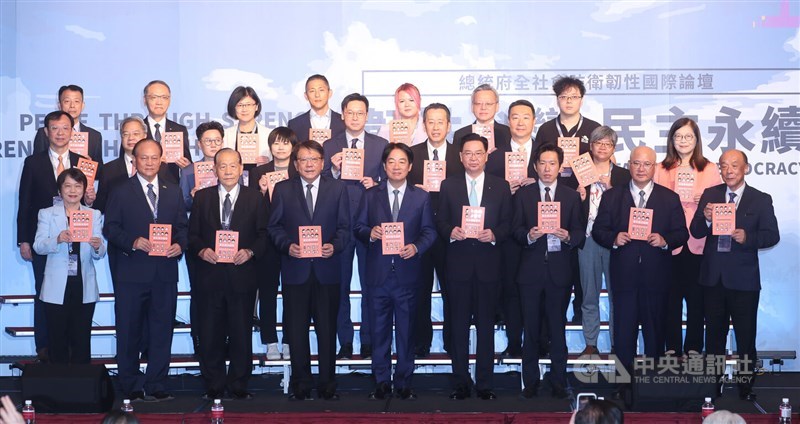
Taipei, Sept. 20 (CNA) Raising public awareness and encouraging individual preparedness are essential to building a resilient society in the face of natural disasters and geopolitical challenges, experts said Saturday during a Presidential Office forum.
"It's about raising the awareness [that] all households, all citizens...have to be able to take care of themselves" during emergencies, said Aki Laiho, a senior official at Finland's National Emergency Supply Agency.
He emphasized the need for individuals to take responsibility for their own preparedness, highlighting Finland's "72-hour concept" that urges households to stock enough food and key supplies to survive at home for at least three days without relying on outside services.
"Everybody needs to be able to take care of themselves and the family and the people near them for a while," and should only call the government in when "critical services get interrupted," he said.
James Barros, an official from Hawaii's Emergency Management Agency, echoed the same view but noted that "getting our citizens to understand that" was difficult.
"I can tell the families that aren't ready for a natural disaster. They're the ones that run to the store, and they buy toilet paper and rice, and that's it, That's their get-ready for a disaster," Barros said.
Barros said that in Hawaii, where 95 percent of food arrives by ship from the U.S. mainland on five- to seven-day journeys, authorities were urging residents to stockpile two weeks of supplies, including food, water, power sources and medicine.
"We're constantly pushing that [message] out in every way we can," Barrow said, adding that public awareness campaigns extended from movie theaters to newspapers.
Liu Te-chin (劉德金), a senior advisor to Taiwan's National Security Council, acknowledged the difficulty of persuading Taiwanese to regularly stockpile and replenish food and other essential supplies, given the easy access to such goods in normal times.
He argued, however, that increasing household food storage directly contributes to strengthening the nation's overall food resilience.
Speaking on supply distribution and logistics, Liu said the government was exploring the use of drones to deliver goods more efficiently to remote and rural areas, where residents still rely on government rations for certain necessities.
At the same time, he said the government also works with Taiwan's convenience stores to ensure access to essential goods, such as masks during the COVID-19 pandemic, in different communities.
Jas Huang (黃士杰), head of Taiwan FamilyMart's Membership and Data Innovation Research Department, said the company is upgrading its food production and logistics systems to ensure it can maintain operations for a limited period using backup power and alternative sources during outages.
FamilyMart is Taiwan's second-largest convenience store chain by market share, in a market of more than 13,000 stores.
Saturday's forum marked the first anniversary of the Whole-of-Society Defense Resilience Committee under the Presidential Office, an ad-hoc advisory body focused on civil defense.
- Society
Taipei rally voices migrant workers' anger over work-year limit
12/07/2025 09:34 PM - Society
U.S. vaccine rollback 'regressive,' requires Taiwan vigilance: Expert
12/07/2025 09:15 PM - Society
Firefighters extinguish blaze at Sanxia chemical factory
12/07/2025 09:13 PM - Society
Man arrested for ax attack against police officer detained
12/07/2025 09:02 PM - Business
For TSMC employees in Phoenix, Taiwan Mama delivering taste of home
12/07/2025 06:51 PM